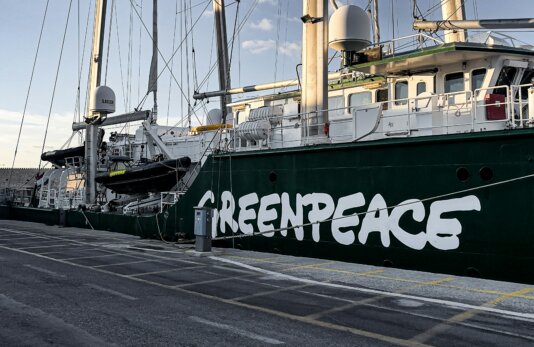- About
- Topics
- Story
- In-Depth
- Picks
- Opinion
- News
- Donate
- Signup for our newsletterOur Editors' Best Picks.Send
Read, Debate: Engage.
| topic: | Rule of Law |
|---|---|
| tags: | #activism, #Shell, #piracy |
| located: | Japan, Belgium, USA, Peru, Russia |
| by: | Laurence Teillet |
Under international law, piracy is defined as any illegal acts of violence, detention or depredation committed for private ends against another ship or aircraft on the high seas or property located in areas beyond national jurisdiction. This definition, found in the United Nations Convention on the Law of the Sea (UNCLOS), appears clear at first glance – but its key terms are particularly ambiguous.
The notion of “private ends” is specifically contested. While sometimes understood to exclude acts with political motives, recent case law increasingly suggests that “private” should be read as “not authorised by a State.” This opens the door for politically motivated protest actions – such as those carried out by environmental activists – to be treated as piracy, even if the activists see themselves as serving the public good.
The concept of violence is also interpreted broadly, including not only physical harm but also moral force or even acts against property. Meanwhile, the term “high seas” is applied expansively to include not only the waters beyond national jurisdiction but also Exclusive Economic Zones (EEZs) and continental shelves.
This legal murkiness has enabled companies and some governments to wield the piracy label as a tool to delegitimise and suppress environmental activism. Throughout the 1980s and 2010s, companies such as NL Chemicals, Bayer, Shell, and the Institute for Cetacean Research (ICR) in Japan accused environmental protestors of piracy to shut down their actions. For example, in 1986, Greenpeace activists in Belgium faced a preliminary injunction for obstructing the dumping of toxic waste. The court ordered them to cease their activities and imposed an extraordinary penalty: one million Belgian francs per day for any delay caused by the Sirius crew.
In the United States, the Sea Shepherd Conservation Society found itself at the centre of similar legal proceedings in 2013. After targeting Japanese whalers in the Antarctic Ocean, Sea Shepherd was hit with both preliminary injunction and declaratory relief, initiated by the ICR. A preliminary injunction is a temporary court order preventing someone from acting while the case is being resolved, whereas declaratory relief is a statement from the court clarifying the legal rights or status of the parties involved. These are civil – not criminal – actions, meaning activists aren’t jailed, but are often forced to halt operations and pay steep financial penalties.
Although these legal measures are civil in nature, some States have also considered, or even attempted, criminal prosecution. In 1982, Peru threatened to charge Greenpeace with piracy, although the matter was eventually resolved informally. A more dramatic incident occurred in 2013 during the Arctic Sunrise case. After Greenpeace protested against oil exploitation in Russia’s EEZ, Russian authorities boarded the vessel, detained the activists and initially charged them with piracy. However, likely recognising the legal weaknesses in their case, Russia later downgraded the charges to hooliganism. This shift was no coincidence: piracy, as a legal category, grants expansive powers of intervention on the high seas, including the right to board and detain vessels – privileges Russia sought to invoke, even if briefly.
This brings us to the question: is it lawful to label these activists as pirates?
Based on current interpretations of international law, the answer is: sometimes. The broad reading of “private ends” and “violence” means that protest actions – even when symbolic – could technically fall within the piracy framework if carried out against ships on the high seas without State authorisation. This raises serious concerns about overreach. The concept of piracy was originally intended to address acts of serious violence for personal gain, not acts of civil disobedience driven by public interest.
When it comes to offshore platforms, the legal ground is even more unstable. Piracy can involve acts against property, but only if that property is in an area outside any State’s jurisdiction. Unlike ships, platforms are fixed and generally located within EEZs or continental shelves, which are under some degree of national control. Therefore, attacks on platforms in these zones are unlikely to qualify as piracy under international law. This distinction proved critical in the Arctic Sunrise case, where multiple international bodies – including the International Tribunal for the Law of the Sea, the Permanent Court of Arbitration, and the European Court of Human Rights – affirmed that the piracy charge was not sustainable.
So far, the consequences activists have faced have been significant but not criminal – ranging from injunctions and fines to detention and boarding. But the threat of stronger enforcement is present. If a State were to pursue criminal piracy charges and push for full prosecution, activists could face imprisonment and, in some jurisdictions, even the death penalty – since some States still retain capital punishment for piracy.
Given the strategic value of the piracy label – both for enabling State intervention and for discrediting environmental movements – the risk remains very real.
That said, acts of violence should not go unpunished. But we already have legal frameworks equipped to address protest activities at sea that would become too violent – frameworks that do not carry the dehumanising rhetoric of “piracy” or the extraordinary consequences it entails.
Labelling activists as pirates not only mischaracterises their actions but also grants every State expansive enforcement powers that bypass all jurisdictional safeguards for the accused. It is this overreach – not the actions of protestors – that poses the greater threat to the rule of law at sea.
Laurence Teillet is a lecturer at Nottingham Law School.
Image by Evangelos Mpikakis.
